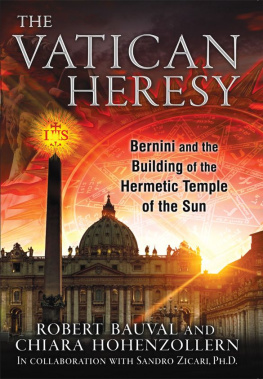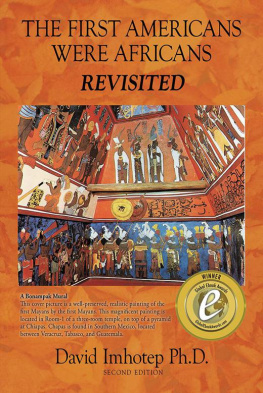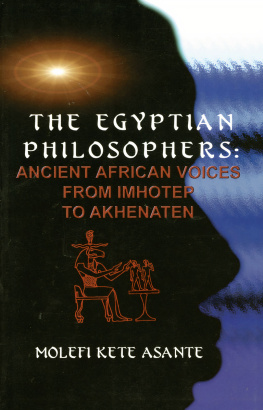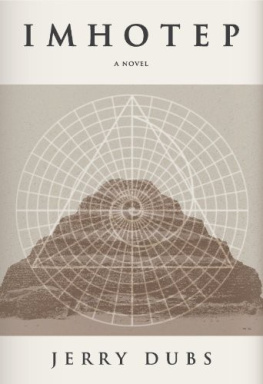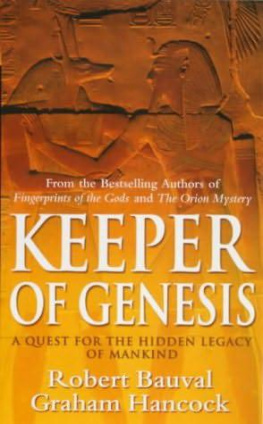Robert Bauval - Imhotep the African: Architect of the Cosmos
Here you can read online Robert Bauval - Imhotep the African: Architect of the Cosmos full text of the book (entire story) in english for free. Download pdf and epub, get meaning, cover and reviews about this ebook. year: 2013, publisher: Disinformation Books, genre: Science fiction. Description of the work, (preface) as well as reviews are available. Best literature library LitArk.com created for fans of good reading and offers a wide selection of genres:
Romance novel
Science fiction
Adventure
Detective
Science
History
Home and family
Prose
Art
Politics
Computer
Non-fiction
Religion
Business
Children
Humor
Choose a favorite category and find really read worthwhile books. Enjoy immersion in the world of imagination, feel the emotions of the characters or learn something new for yourself, make an fascinating discovery.

- Book:Imhotep the African: Architect of the Cosmos
- Author:
- Publisher:Disinformation Books
- Genre:
- Year:2013
- Rating:4 / 5
- Favourites:Add to favourites
- Your mark:
- 80
- 1
- 2
- 3
- 4
- 5
Imhotep the African: Architect of the Cosmos: summary, description and annotation
We offer to read an annotation, description, summary or preface (depends on what the author of the book "Imhotep the African: Architect of the Cosmos" wrote himself). If you haven't found the necessary information about the book — write in the comments, we will try to find it.
Imhotep the African: Architect of the Cosmos — read online for free the complete book (whole text) full work
Below is the text of the book, divided by pages. System saving the place of the last page read, allows you to conveniently read the book "Imhotep the African: Architect of the Cosmos" online for free, without having to search again every time where you left off. Put a bookmark, and you can go to the page where you finished reading at any time.
Font size:
Interval:
Bookmark:
Imhotep the African is an archeological detective story. Bauval and Brophy make the case that the legendary Egyptian physician, architect, and astronomer Imhotep was not only an historical figure but that he was black. This remarkable book challenges many assumptions about life along the Nile, revealing a worldview and technology that was more sophisticated than anything previously imagined.
Stanley Krippner, Ph.D., co-author of Personal Mythology
Bauval and Brophy have once again brought their keen intellectual and scientific skills to bear by examining an aspect of ancient history that contemporary Egyptologists have been either too afraid or too unwilling to investigate. Imhotep the African is the perfect sequel to Black Genesis , for it presents incontrovertible truths that will either be accepted on their merits or ignored for fear of exposing a house of lies built upon foundations of historical falsehoods. It is evident to many of their colleagues that Robert Bauval and Thomas Brophy are the dynamic duo of independent Egyptologists. They are to be commended for their scholarship and their dogged determination to present an honest assessment of historical eventseven if it flies in the face of conventional dogma.
Anthony T. Browder, author and independent Egyptologist
Black Genesis offers astounding new insights as Bauval and Brophy forcefully support, with hard data, the radical idea that Egyptian civilization was the outgrowth of a sophisticated Black African culture that existed thousands of years prior to the earliest known pharaohs. Their book is a must read for anyone interested in genuinely understanding the true origins of ancient Egypt and the dynamics of how civilizations develop.
Robert M. Schoch, Ph.D., author of
Voyages of the Pyramid Builders and Pyramid Quest
Readers of Black Genesis will never think of ancient Egypt in the same way again. Bauval and Brophy make the case that this venerable civilization was originated by Black Africans from the Sahara Desert and that the pyramids, the statues, and the hieroglyphs were the result of their knowledge and ingenuity. The authors trace the series of errors and misjudgments that have obscured the origins of this remarkable civilization. It is time for the record to be set straight, and Black Genesis is the book that may well do it. This is an authoritative, excellent, well-written book.
Stanley Krippner, Ph.D., professor of psychology
at Saybrook University and co-author of Personal Mythology
In Black Genesis , Bauval and Brophy combined their investigative skills to answer an obvious but often-neglected question, who were the ancient Egyptians? With new astroarchaeological evidence they build a strong case for the African origin of the pharaohs and have dramatically altered our understanding of the past.
Anthony T. Browder, author and independent Egyptologist
Extremely dense and possibly groundbreaking, Bauval and Brophy make an honest case for a very different story of the origins of ancient Egypt. Their scholarship is meticulous.
Publisher's Weekly , June 2011
... packed with revelations!
Midwest Book Review, July 2011
The tales of the authors' 2008 expedition and of explorers in the past century add to the enticing read.
Nexus Magazine , August 2011
Recommended.
R. Fritze, Athens State University,
Choice Reviews Online, October 2011
Both authors are highly accredited researchers who have provided an incredibly detailed book examining the connection between the astronomy of the pharaohs and their Neolithic counterparts.
Fate Magazine, October 2011
Black Genesis is a captivating, thought-provoking, utterly intriguing read that traces back the origins of the high civilization of ancient Egypt into deepest prehistory. Buckle your seatbelts for a rollercoaster ride.
Graham Hancock, author of Fingerprints of the Gods
In The Egypt Code Robert Bauval unveils a sacred landscape, lost for thousands of years, and provides us, literally, with the key that unlocks ancient Egypt.
Graham Hancock, author of Supernatural and Fingerprints of the Gods
Bauval's arguments are very convincing.... They are practical, scientific views and they explain a lot that is otherwise difficult to understand. Most of all, this book is imbued with the sense of wonder that is essential for good science, plus the intrigue of a good thriller.
Popular Science
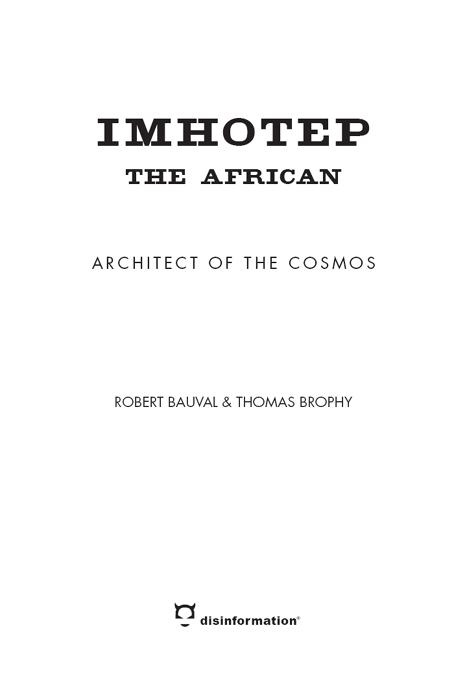
Published by Disinformation Books,
An imprint of Red Wheel/Weiser, LLC
With offices at
665 Third Street, Suite 400
San Francisco, CA 94107
www.redwheelweiser.com
Copyright 2013 by Robert Bauval and Thomas Brophy. All rights reserved. No part of this publication may be reproduced or transmitted in any form or by any means, electronic or mechanical, including photocopying, recording, or by any information storage and retrieval system, without permission in writing from Red Wheel/Weiser, LLC. Reviewers may quote brief passages.
ISBN: 978-1-938875-02-1
Library of Congress Cataloging-in-Publication data available upon request
Cover design by Jim Warner
Interior design by Kathryn Sky-Peck
Cover photograph Omar Buckley
Printed in the United States of America
MAL
10 9 8 7 6 5 4 3 2 1
Disinformation is a registered trademark of The Disinformation Company Ltd.
www.redwheelweiser.com
www.redwheelweiser.com/newsletter
To Michele, my wife, always, for your good nature, love, and support .
ROBERT BAUVAL
To the memory of my beloved sister, Jayne Brophy, 19562012, and to her two surviving children, Abby and Michael,
whom she loved more than the moon and the stars .
THOMAS BROPHY
As always, our first thanks go to our respective families. Their support, love, and patience are greatly appreciated. We wish to pay special thanks and tribute to the Nile Valley Conference II, Morehouse College president Robert M. Franklin, and conference chair Charles S. Finch III for hosting us to Atlanta (September 2011), where we were honored to present at this unique conference, a twenty-seven-year follow-up to the first conference arising out of the U. S. civil rights movement.
We also thank the many friends and colleagues who, directly and indirectly, have helped us put this book together: Laura Salvucci; Tony Browder; Jean-Paul Bauval; David Rohl; Hesham El Haddad; Hoda Hakim-Taraboulsi; Ahmed Osman; Omar Buckley; Gary Baddeley; Maria Pia Tocco; Richard Fusniak; Joanne Cunningham; Mark Borda; Mayumi Hashiyama; Robert Schoch; Catherine Ulissey; Ambassador Jean-Paul Tarud-Kuborn; Amon Saba Saakana; Terre Brophy-Smith; June and Jim Brophy; Amanda-Jayne and Allison Smith; Hope Umansky; Hideki Baba; and Tamiko Voros. Many others remain unnamed, but they always know our gratitude for their friendship and love.
A few kilometers outside the modern city of Cairo, on a large, flat elevation at the edge of the Sahara overlooking the Nile, is the world's very first architectural complex. Nearly 5,000 years old, the centerpiece of this mindboggling complex is a huge stepped pyramid surrounded by strange temple-like structures, the lot contained inside a giant perimeter wall whose length is more than 1,500 meters. Aligned conspicuously toward the four cardinal directions, this strange place evokes a mood, for lack of better words, of sacred architectureor, perhaps more aptly, sacred astronomy. No doubt something extremely potent took place herecertainly rituals of the highest order that somehow involved the cycles of the celestial bodies as seen through the eyes of a holy man or shaman. Amazingly, when one considers the extreme antiquity of this complex, Egyptologists know for sure who conceived it: Imhotep, the high priest of Heliopolis and vizier of King Netjerykhet/Djoser of the 3rd Dynasty in c. 2650 BC. And that, if the truth be told, is just about all they know with certainty. All else is educated guesses, speculation, and even fanciful thinking derived from later sources when Imhotep the man had been mythologized and even deified beyond recognition.
Font size:
Interval:
Bookmark:
Similar books «Imhotep the African: Architect of the Cosmos»
Look at similar books to Imhotep the African: Architect of the Cosmos. We have selected literature similar in name and meaning in the hope of providing readers with more options to find new, interesting, not yet read works.
Discussion, reviews of the book Imhotep the African: Architect of the Cosmos and just readers' own opinions. Leave your comments, write what you think about the work, its meaning or the main characters. Specify what exactly you liked and what you didn't like, and why you think so.

